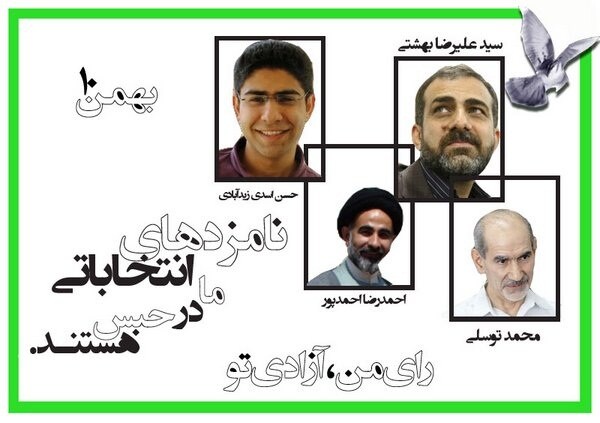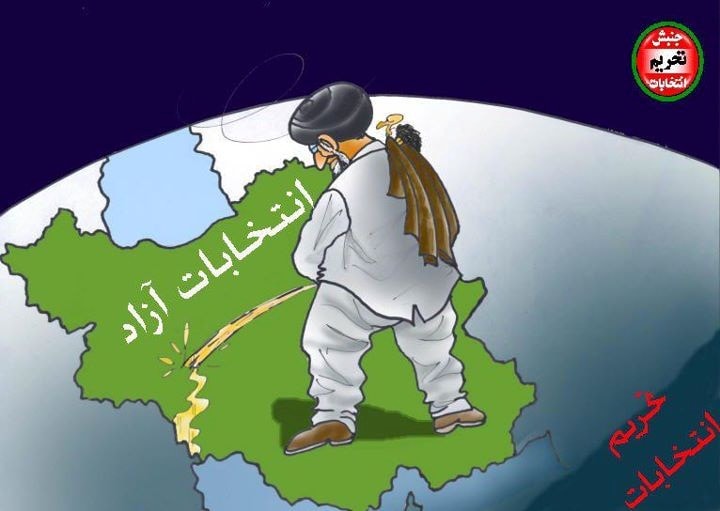Introduction
The elections for Iran's ninth Majlis were held on March 2, 2012, with 3,500 candidates competing for 290 seats. The number of eligible voters was close to 48 million. Following calls from opposition circles to boycott the elections, the regime stated in advance that it anticipated a turnout of 65%, and immediately after the elections, it announced that the turnout had indeed been 64.2%.[1]
The Elections – Key Trends and Facts
The elections were characterized by a number of key trends and facts:
1. In the wake of the crisis between Supreme Leader Ali Khamenei and President Mahmoud Ahmadinejad, the regime, under Khamenei's direction, systematically disqualified pro-Ahmadinejad candidates, which are dubbed as belonging to the "deviant stream."[2] The regime's ostracizing of Ahmadinejad and his supporters is reflected, for example, in statements made by the president's former religious parton, Ayatollah Mesbah-e Yazdi, at a February 29 conference in Qom. He said that Ahmadinejad's election in 2009 had been fair, but that afterwards, the president had worked against the regime: "We [found ourselves] in a situation where the president, elected by the people, was actually working against Islam, the Imam [Khomeini] and the interests of the state, and was even party to killing hundreds of innocent martyrs. We cannot say that he came to power through [election] fraud, because there was no such fraud. But the public did not know him, and later events caused us to realize our mistake. We must not repeat the mistakes of the past, and must not fall for the deceit and propaganda of the deviant stream. You must vote for those who realize the plight of the religion, the people's pain and the plight of the revolution, and will therefore serve the people honestly."[3]
2. Under Khamenei's direction, the regime also systematically disqualified pro-reform candidates from running in the elections, as part of its ongoing campaign to eliminate the reformist stream and the Green Movement, and to marginalize Hashemi Rafsanjani.
3. The dissidents, the Green Movement and student organizations called upon the public to boycott the elections, among other reasons, because they were not free and because the Green Movement leaders, Mir Hossein Mousavi and Mehdi Karroubi, have been under house arrest for a year at Khamenei's orders.[4]

Green Movement Campaign: "My Candidates Are in Prison"[5]
In a debate with Majlis Member Hamid Rasaei at the University of Tehran, reformist academic Sadegh Zibakalam said that the elections were a farce intended to grant the regime political maneuverability, and assessed that turnout would not be significant, because the elections could not make any change to the makeup of the Majlis.[6] In an interview with the Kaleme website, Ardeshir Amir Arjomand, the spokesman of the Green Movement Coordination Council and an advisor to Mousavi, thanked the public for boycotting the elections, and said that the reported turnout rate of 64% had been pre-determined by the regime. He added that this figure was just as reliable as the claim of Syrian President Bashar Al-Assad that over 50% of Syria's citizens had participated in the recent referendum even while he was massacring them.[7] Broadly speaking, the Iranian public received the elections with indifference. The student sector, which in the past has exhibited a high level of political involvement, showed little interest in the debates that were held at the universities by representatives of various parties, and attendance at these events was thin.[8]

Cartoon on Facebook page titled "I'm Not Voting" shows a cleric (possibly Khamenei) urinating on a map of Iran (colored green to represent the Green Movement) and on a caption calling for "free elections."[9]
4. Fearing a mass boycott of the elections, the regime launched an intense campaign exhorting the public to participate, so as to demonstrate that the regime has a broad support base. To this end, it recruited ayatollahs and jurisprudents who ruled that voting is a religious duty,[10] politicians who warned that boycotting the elections would serve the West and harm the regime, and various other figures, such as Mohammad Baqer Qalibaf, the mayor of Tehran, and Yahya Rahim Safavi, Khamenei's security advisor, who urged the public not to participate in the boycott.[11] IRGC Political Bureau head Yadollah Javani said at an IRGC conference that nobody had the right to refrain from voting, explaining that a maximal turnout would express the people's support for the regime.[12] The daily Kayhan claimed that voting would cause the West to stop pressuring Iran: "If, on March 2, the West assesses that the pressure [exerted upon] the Iranian people has not caused it to change its views [regarding the regime], [that pressure] will stop."[13] One month earlier, Kayhan had stated that the reformists' boycott of the elections was the result of a conspiracy hatched by the White House, aimed at weakening the Iranian regime, and added that boycotting these elections was a greater act of treason than what had occurred during the presidential elections in 2009, which resulted in fitna.[14] At a conference of martyrs' families, senior IRGC official Mohammad Reza Yazdi said, in a similar vein, that "the people's participation in the elections would directly affect the next steps of [Iran's] enemies."[15]
In fact, the regime proclaimed that anyone calling to boycott the elections was party to the enemies' conspiracy against the regime, and would be punished.[16] On the eve of the elections, the regime stepped up its intimidation campaign. It posted street signs in Tehran warning the public that a low voter turnout would result in an American attack on Iran, and, according to bloggers, also sent out text messages to the same effect. The messages were attributed to oppositionist sources, such as Balatarin and Radio Farda – two anti-regime websites operating from outside Iran.[17]

Poster in Tehran: "Balatarin: The Western countries refrain from attacking Iran because they believe the Iranian people supports the regime and will take part in the elections."[18]

Text message sent to the Iranian public: "Radio Farda: the U.S. might consider attacking Iran if the Iranian people's participation rate in the upcoming elections is under 50%"[19]
The regime also stressed that, by voting, the Iranian people would deal a severe blow to their enemies. The deputy secretary of Iran's Supreme National Security Council, Ali Baqeri, said at a students' conference that "every vote cast into the ballot box is like a cruise missile launched at the U.S., and exacts a price from [that country]."[20] In a similar vein, Ayatollah Janati said after the elections, at a March 9 Friday prayer at Tehran University, that every vote cast was like "a resounding slap to the enemy's face."[21]
5. The election results (i.e., the sweeping support for Khamenei's representatives) were effectively known in advance, because only two coalitions were allowed to compete, both of them representing the conservative stream (the only stream whose activity is permitted): the United Conservative Front (Jebhe-ye Osulgarayan), headed by Experts Assembly Chairman Ayatollah Mohammad Reza Mahdavi-Kani, and the Stability Front (Jebhe-ye Paydari), headed by Experts Assembly member Mohammad Taqi Mesbah-e Yazdi, a radical Ayatollah who was once a supporter of Ahmadinejad but who has since turned against him.[22]
6. Former president Mahmoud Khatami and Expediency Council head Hashemi Rafsanjani, both of them regime officials who are affiliated with the Green Movement and therefore ostracized by the regime, nevertheless demonstrated their compliance with the regime's directives by publicly voting in the elections. Like Ahmadinejad, who belongs to the opposite (i.e., the radical messianic) stream, they are members of the regime's ruling elite who continue to support the regime despite their criticism in recent years of Supreme Leader Khamenei. In a press conference he held after casting his vote, Rafsanjani said that he hoped these elections would not be marred by fraud, hinting at the suspicions of massive fraud raised following the 2009 elections. "With God's help," he said, "the election results will accurately [reflect] the people's will and the votes cast. If this happens, with God's help we will have a good Majlis."[23]

Khamenei says "Bravo! Bravo!" to the politically ostracized Ahmadinejad, Rafsanjani and Khatami as they cast their votes into the ballot box.[24]
7. It seems that, in these elections, Khamenei wished to ensure the formation of an utterly loyal Majlis, consisting of nobody but traditional-moderate conservatives. Such a Majlis will allow him to maintain calm within the regime and to avoid internal conflicts with the presidency after Ahmadinejad concludes his current and last term in office next year. In the meantime, the president will presumably be hobbled by the Khamenei-dominated Majlis, and his role will be largely symbolic.
* A. Savyon is Director of the Iranian Media Project; Y. Mansharof is a research fellow at MEMRI.
[1] Press TV (Iran), March 3, 2012. Ali Saeedi, the representative of Iranian Supreme Leader Ali Khamenei in the Iranian Revolutionary Guards Corps (IRGC), and Mohammad Saffar-Harandi, an advisor to IRGC commander Mohammad Ali Jafari, assessed that the turnout would be about 60%. Fars (Iran), February 16, 2012; yjc.ir, February 27, 2012. Jafari himself placed the bar of expectations higher, stating that over 80% of the public supported Khamenei and the principles of the revolution. shabestan.ir, February 12, 2012. The website Baztab Emrouz alleged that the regime had deliberately misreported the number of eligible voters in the Tehran and Alborz provinces in order to present a higher turnout rate. The report was later removed from this website, but was quoted on the website Digarban on March 3, 2012. See http://www.digarban.com/node/5295.
[2] At a February 25 election rally, Hossein Fadaei, secretary-general of the Society of Devotees of the Islamic Revolution (Ithargaran), formerly a supporter of Ahmadinejad, said that the regime had disqualified all 600 candidates of the "deviant stream." Mehr (Iran), February 25, 2012. The Iranian president's sister, Parvin Ahmadinejad, who ran for parliament, failed to win a seat. Asriran.com (Iran), March 3, 2012.
[3] Fars (Iran), February 29, 2012.
[4] Kaleme.com, February 23, 2012.
[5] Kaleme.com, January 30, 2012.
[6] ILNA (Iran), February 27, 2012. Findings of a survey presented on Iranian TV indicated that about a third of the public was indifferent to the elections. Leziran.com, February 19, 2012.
[7] Kaleme.com, March 4, 2012.
[8] Digraban.com, February 21, 2012.
[9] http://www.facebook.com/photo.php?fbid=332497000111977&set=a.238505812844430.71671.238504892844522&type=1&theater.
[10] For example, Ayatollah Mohammad Ali Mousavi Jazairi, Khamenei's representative in Khuzestan, said that "participating in the elections is a national and religious duty." Shabestan.ir, February 3, 2012. For similar statements by Ayatollah Nouri Hamedani, see Nasimonline.ir, January 20, 2012. For statements by Ayatollah Makarem-Shirazi, see Fars (Iran), February 22, 2012.
[11] ISNA (Iran), February 20, 2012. lenziran.com, February 29, 2012.
[12] ISNA (Iran), February 26, 2012.
[13] Kayhan (Iran), February 29, 2012.
[14] Kayhan (Iran), January 31, 2012.
[15] IRNA (Iran), February 27, 2012.
[16] IRNA (Iran), February 12, 2012. khabaronline.ir, December 31, 2011.
[17] Roozonline.com, February 29, 2012.
[20] Fars (Iran), February 8, 2012.
[21] Fars (Iran), March 9, 2012.
[22] The president's office issued a statement saying that the government (headed by Ahmadinejad) would not interfere in the elections or support any stream. ILNA (Iran), February 23, 2012. However, on the eve of the elections, the Unity and Justice Front, a party associated with Ahmadinejad's supporters, published a list of recommended candidates that included senior figures from both the United Conservative Front and the Stability Front, in order to provoke these coalitions. In response, the coalitions renounced the publication, and said that the inclusion of their candidates on the list of the "deviant stream" was done without their knowledge or consent. ILNA (Iran), February 23, 2012.
[23] ILNA (Iran), March 2, 2012.
[24] Roozonline.com, March 3, 2012.





